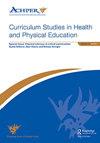将新西兰奥特罗阿的学校卫生教育与关键的卫生知识普及联系起来的案例
IF 1.8
Q2 EDUCATION & EDUCATIONAL RESEARCH
Curriculum Studies in Health and Physical Education
Pub Date : 2022-05-30
DOI:10.1080/25742981.2022.2082310
引用次数: 3
摘要
关键健康素养(CHL),更具体地说,在学校健康教育中培养年轻人的关键健康素养是一个研究不足的领域。尽管健康知识被视为当代健康的关键决定因素(世界卫生组织,2016a)。健康扫盲的任务。https://www.who.int/healthpromotion/conferences/9gchp/health-literacy/en/)以及人们日益认识到,在二十一世纪,人们需要成为关键的知识消费者和生产者。在本文中,我们介绍了一项定性研究的结果,该研究探讨了新西兰奥特亚高中学校健康教育的学习经验和结果。我们根据一系列作者对CHL组成部分的描述进行了演绎主题分析。我们的研究结果表明,健康教育有多种方式有可能与CHL的发展联系起来,这些方式分为四个主题:采取个人和集体行动促进健康、人际意识和技能、了解社区和政治结构以及健康的社会决定因素、批判性思维和对健康相关信息的评估。最后,我们对复杂时代与CHL相关的政策和实践进行了总结,并为未来在这一研究不足的领域进行研究提供了途径。本文章由计算机程序翻译,如有差异,请以英文原文为准。
A case for connecting school-based health education in Aotearoa New Zealand to critical health literacy
ABSTRACT Critical health literacy (CHL) and more specifically the development of young people's CHL in school-based health education is an under-explored area in research. This is despite health literacy being viewed as a critical determinant of health in contemporary times (World Health Organization. (2016a). The mandate for health literacy. https://www.who.int/healthpromotion/conferences/9gchp/health-literacy/en/) and the ever-growing recognition of the need for people to be critical consumers and producers of knowledge in the twenty-first century. In this paper, we present findings from a qualitative study which explored the learning experiences and outcomes of senior secondary school-based health education in Aotearoa New Zealand. We conducted a deductive thematic analysis based upon a range of authors' descriptions of the components of CHL. Our findings indicate multiple ways in which health education has the potential to connect to the development of CHL, with these organized into four themes: Taking individual and collective action to promote health, interpersonal awareness and skills, knowledge of community and political structures and social determinants of health, critical thinking and appraisal of health-related information. We conclude the paper with implications for policy and practice relating to CHL in our complex times, as well as avenues for future inquiry in this under-researched area.
求助全文
通过发布文献求助,成功后即可免费获取论文全文。
去求助
来源期刊

Curriculum Studies in Health and Physical Education
Social Sciences-Education
CiteScore
3.00
自引率
10.50%
发文量
33
 求助内容:
求助内容: 应助结果提醒方式:
应助结果提醒方式:


